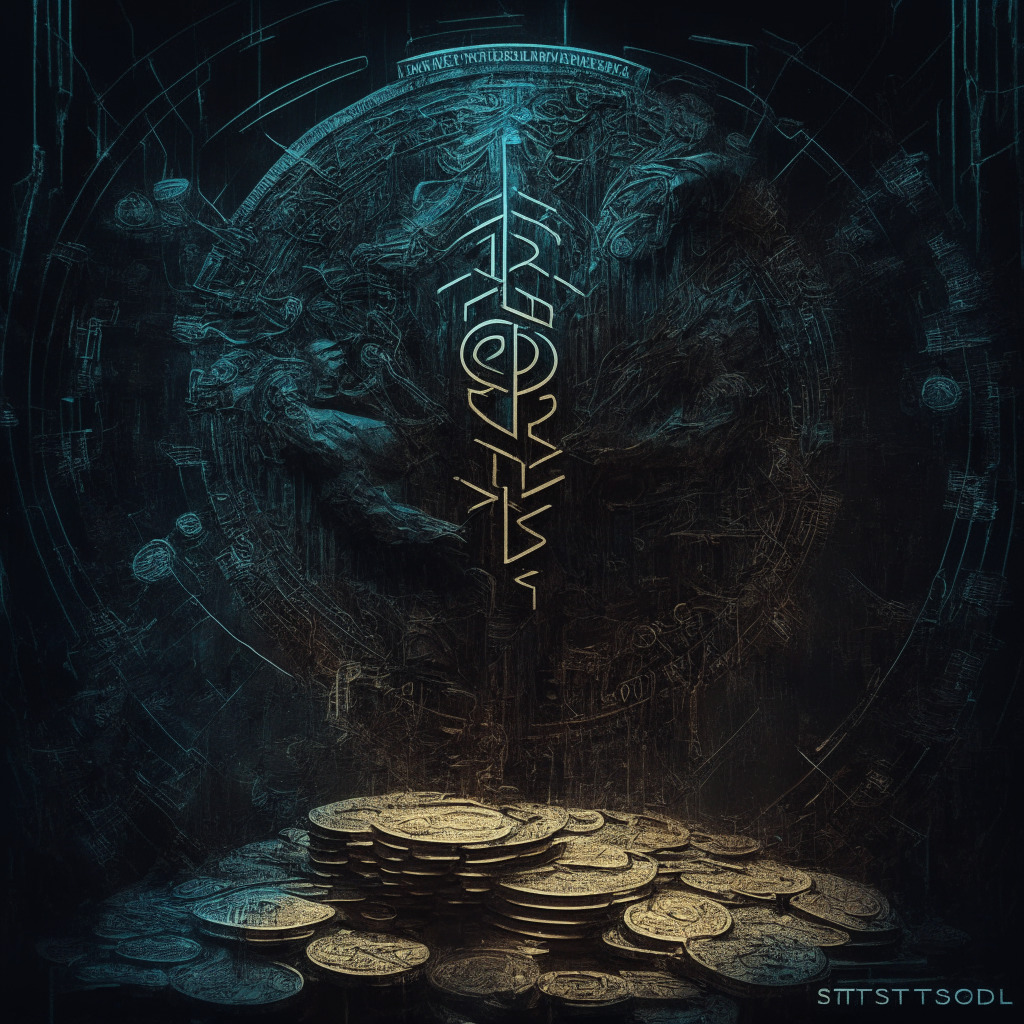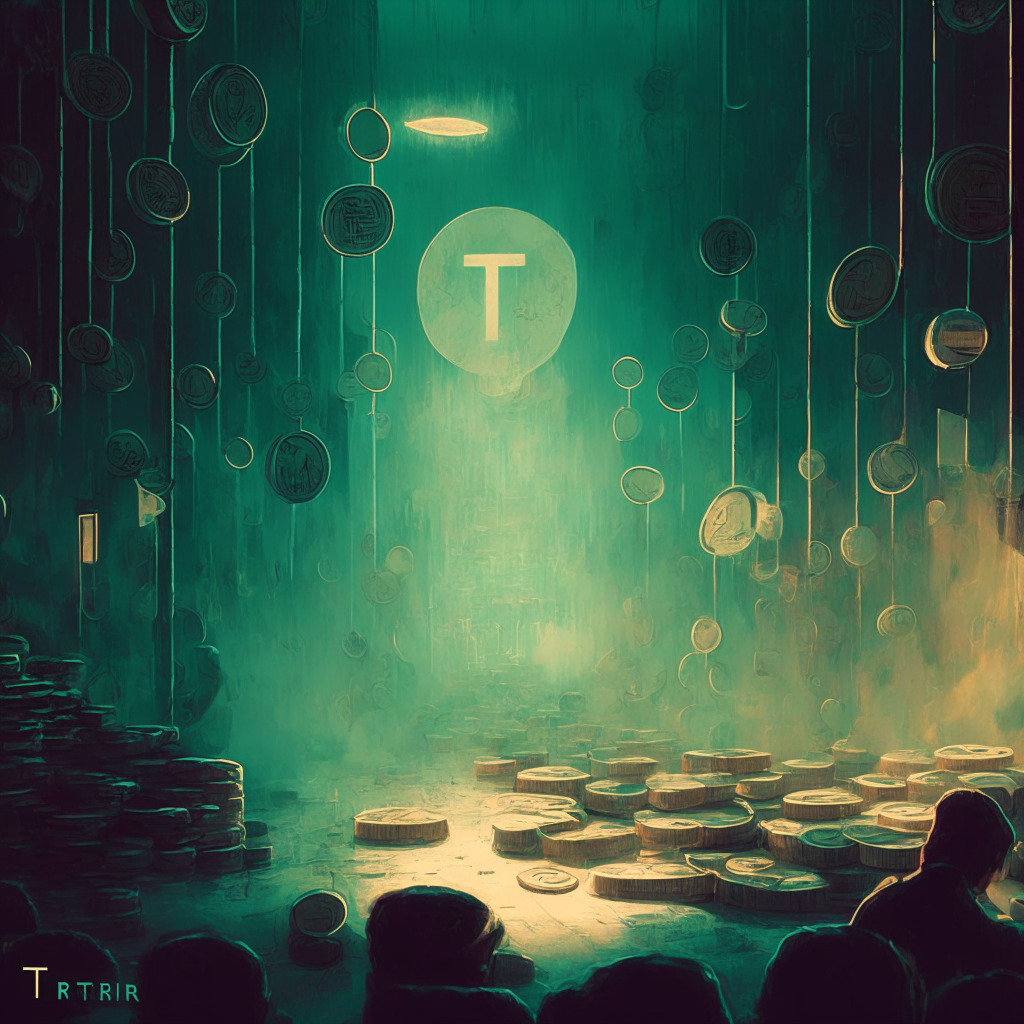Coinbase is reportedly purchasing a minority stake in Circle Internet Financial, which coincides with Circle bringing the issuance of the USD Coin entirely in-house. Additionally, six more blockchains are to be integrated with USDC. This move comes amidst increasing competition and regulations within the stablecoin environment.
Search Results for: USD Coin
PayPal’s PYUSD Stablecoin: Welcomed Asset or Threat to Tether’s Predominance?
Tether co-founder, William Quigley, in a recent interview expressed skepticism towards the acceptance of PayPal’s impending stablecoin. Highlighting that cryptocurrencies earn credibility over time, he outlined that new entrant, PayPal, would face challenges in gaining trust and performance reputation among crypto users. He flagged significant regulatory challenges and the high cost of compliance as potential hurdles for PayPal’s stablecoin.
PayPal’s Venmo and the Stalled Adoption of PYUSD Stablecoin: Analysis and Future Implications
“PayPal’s mobile payment platform, Venmo, has begun offering its Ethereum-based stablecoin, PYUSD, marking a significant step toward integrating cryptocurrency with mainstream finance. Despite its robust structure and support, PYUSD’s adoption has been slow, likely due to competition and regulatory contradictions.”
Is PayPal’s Ethereum-based Stablecoin, PYUSD, Truly 100% Asset-Backed? Examining the Claims
“PayPal’s Ethereum-based stablecoin, PYUSD, has full asset backing, primarily from U.S. Treasury reverse repurchase agreements, says Paxos. Though overcollateralization safeguards assets, it could limit profits. Some PYUSD assets are in uninsured cash deposits, reflecting typical banking risks. PYUSD’s transparent operation may soothe some investors while raising others’ skepticism.”
PayPal’s PYUSD Stablecoin: Shining Beacon or Misstep in Crypto Space?
“PayPal’s proprietary stablecoin, PYUSD, is criticized due to concerns over centralization and potential vulnerability flaws. Its code could pose adoption hindrances and potentially wipe out balances. The crypto community sees PYUSD as a setback, contrasting the ethos of cryptocurrency.”
Stablecoin De-Pegging: A Deep-Dive into USDC and DAI Performance versus USDT and BUSD
“Analysts reveal ‘de-pegging’ is more common in stablecoins USDC and DAI compared to Tether and Binance USD. While stability ideally requires good governance, collateral and reserves, market confidence and adoption, USDT has shown steadiness despite mainstream scrutiny.”
VISA Leverages Solana Blockchain and USDC Stablecoin for Faster International Payments
“VISA has enhanced its stablecoin settlement ability with Circle’s USDC stablecoin on the high-speed Solana blockchain, making it one of the first financial institutions to harness Solana for scaled settlements. VISA’s integration of stablecoins like USDC on global blockchain networks aims to improve international settlements speed and give clients a modern option to conveniently transact funds.”
Dismantling Binance USD: Unveiling Binance’s Plan to Cease Support for its Stablecoin by 2024
“Binance cryptocurrency exchange plans to remove eight Binance USD trading pairs from its platform, suggesting it could cease support for the stablecoin by 2024. This stems from allegations that the stablecoin’s issuer, Paxos, produced an unregistered security. Concurrently, competitor stablecoin Tether witnesses market growth.”
Circle’s Stablecoin USDC Set to Launch on the Base Network: A Leap Forward or a Leap of Faith?
Circle’s CEO Jeremy Allaire recently announced a significant shift for the company’s U.S. dollar-pegged stablecoin, USDC, which will now launch natively on the Base network. This aims to gradually reduce the need for a bridged coin backed by the Ethereum variant. Despite the development, underlying trust issues remain, emphasising the stability of the Base network and potential issues resulting from reliance on bridged tokens.
PayPal’s PYUSD Stablecoin: A Turbo Boost or Damp Squib for Crypto Adoption?
PayPal’s recently launched stablecoin, PYUSD, appeared to have a slow start with 90% of it residing in Paxos Trust’s reserves and only 7% on crypto exchange wallets. However, despite the somewhat sluggish kick-off, it’s still early days; a shift in the crypto market could significantly change PYUSD’s future prospects.
Coinbase’s Curveball: Acquiring Stake in Circle and Impact on USDC, Coupled With Emerging Legal Battles and Friend.tech’s Surprising Growth
Cryptocurrency exchange Coinbase acquired a minority stake in Circle Internet Financial, causing the dissolution of their Centre Consortium venture, responsible for issuing USD Coin (USDC). Despite this, Circle plans to continue in-house issuance and governance of USDC, which is expanding its support network to include six additional blockchains. Notably, no cash was involved in the transaction between Coinbase and Circle.
The Ripple Effect of PayPal’s PYUSD: Potentially Forcing a Shift in Stablecoin Regulation Debate
The launch of PYUSD, a stablecoin backed by PayPal with over 430 million users, may accelerate crypto adoption and prompt a shift in U.S. policy towards crypto regulation. Despite previous hesitations, the massive user base might force lawmakers to urgently develop a comprehensive regulated framework for stablecoins, heralding a new era of American crypto companies demanding inclusion in economic life.
Navigating Uncharted Waters: PayPal’s Foray into Stablecoin with PYUSD
“PayPal is venturing into cryptocurrencies with its own stablecoin, PayPal USD (PYUSD), which aims to reduce volatility. Despite competing with established stablecoins in a volatile market, PYUSD’s compatibility with future Web3 applications and PayPal’s reputation could grant legitimacy to the crypto industry.”
PayPal’s PYUSD vs Major Stablecoins: A Battle for Market Share or a Losing Game?
“Bank of America suggests PayPal’s stablecoin, PYUSD, may struggle in the face of established competitors like USD Tether (USDT) and USD Coin (USDC). Factors such as lack of fresh functionality and wallet compatibility issues could impede its progress. However, PYUSD has potential to enhance customer experience within the PayPal ecosystem and capitalize on blockchain-enabled asset transfers, payments, and remittance services.”
Unleashing Stablecoins: Assessing PayPal’s PYUSD Launch Amid Political Divides and Regulatory Turbulence
“PayPal’s recent launch of its stablecoin, PYUSD, under the regulatory framework of the New York Department of Financial Services has stirred conversations about stablecoin adoption. Unlike Meta’s unsuccessful Libra, PayPal’s project is viewed more favorably politically, indicating an imminent regulatory framework for stablecoins in the U.S.”
PayPal’s New Stablecoin PYUSD: Exploring its Potential and Uncertainties
“PayPal’s recently unveiled stablecoin, PYUSD, is predicted to enhance payment efficiency. Despite optimism, reception may vary due to competition from central bank digital currencies and yield-bearing stablecoins. Current investors appear unbothered by the lack of yield and focus on safety and availability.”
Exploring the Impacts of PayPal’s Stablecoin PYUSD: Vehicle for Financial Inclusion or Corporate Gain?
“PayPal’s U.S. stablecoin, PYUSD, has sparked interest in the crypto world. Unlike smaller cryptofirms, traditional giants like PayPal can influence regulators to accommodate their aspirations. However, whether PYUSD will democratize access or predominantly serve business interests remains uncertain.”
PayPal Dives into Crypto: Anticipating the Impact and Uncertainties of PayPalUSD Stablecoin
PayPal has entered the cryptocurrency market by creating its own U.S. dollar-pegged stablecoin, PayPalUSD. This move signifies mainstream acceptance of blockchain technology, but also raises concerns of centralized control and potential market manipulation in what has been a decentralized sphere.
Techteryx Takes Over TUSD: A Significant Shift in Stablecoin Landscape or A Risky Gamble?
British Virgin Islands-based firm, Techteryx, announces readiness to take over full-operations of all offshore aspects of TUSD, the fifth largest stablecoin, including minting and redemptions, customer onboarding, and compliance from the previous manager, ArchBlock. Amidst high market capitalization of over $2.8 billion, this move casts significant implications.
SAP Tests USDC Stablecoin Payments: Examining Blockchain’s Impact on Cross-Border Transactions
SAP is testing cross-border stablecoin payments using USDC on Ethereum’s Goerli testnet, aiming to improve international financial transactions. Their blockchain-based solution may offer a more efficient, transparent and cost-effective alternative to traditional cross-border payments, eliminating intermediaries and reducing fees.
Trader’s $4M Short on TUSD: Analyzing Stablecoin Stability Amid Issuer Challenges
A trader took a $4m short position on stablecoin TrueUSD (TUSD) after its issuer temporarily halted mints and redemptions through banking partner Prime Trust. This highlights the importance of vigilance among cryptocurrency enthusiasts, as regulatory scrutiny and operational challenges can affect the value and stability of digital assets like TUSD.
Navigating Stablecoin Challenges: TrueUSD’s Resilience Amid Prime Trust Troubles
TrueUSD announced its TUSD stablecoin has no exposure to the troubled Prime Trust, which halted all fiat and crypto deposits and withdrawals. Despite a temporary halt in minting activities, TrueUSD maintains multiple partnerships and “USD rails” for continuity of service, highlighting the importance of stablecoin issuers’ resilience to disruptions and the need for transparency and safeguards within the digital asset space.
BUSD Market Cap Plummets: The Impact of Regulatory Scrutiny on Stablecoins
Binance-branded BUSD stablecoin’s market cap has dropped to $4.3 billion, falling behind DAI, due to regulatory actions against Paxos, the issuer of BUSD. Stricter regulatory measures led Paxos to end its relationship with Binance, impacting the stablecoin’s market position.
BUSD’s $1 Billion Market Cap Dip: Analyzing Stablecoin Dynamics & Regulatory Impact
Binance USD’s market cap recently dipped over $1 billion, amid challenges including a Wells Notice, NYDFS order to halt issuance, and an SEC lawsuit. This raises questions about the future of dollar-pegged stablecoins and regulatory influence on their operations and adoption.
USDT Stablecoin: Uncovering Chinese Backing and the Quest for Transparency in Crypto
Documents from the New York Attorney General’s Office reveal Tether’s USDT stablecoin was backed by Chinese securities, contradicting previous denials. Tether held foreign securities, including Deutsche Bank and Barclays Bank, to support reserves. The findings prompt questions about USDT’s safety and legitimacy, and emphasize the importance of transparency in the crypto industry.
Tether’s USDT Losing Dollar Peg: Impact on Stablecoin Pools and Crypto Landscape
Tether’s USDT stablecoin lost its dollar peg, leading to an imbalance in stablecoin trading pools as traders exchanged USDT for USDC and DAI. This resulted in USDT balances on Curve’s 3pool rising to over 70%, straying from the intended equal distribution among the three stablecoins.
Is Tether’s USDT Stablecoin Under Pressure? Examining Unusual Selling Activity
Speculation mounts that Tether’s USDT stablecoin may be under pressure, with liquidity pools on Uniswap and Curve protocols flooded with USDT sellers. A potential USDT depeg could be catastrophic for the crypto economy, raising concerns over its liquidity and stability amidst growing market share.
Stablecoin Stability: MakerDAO’s Shift to Spark Protocol and Lessons from the USDC Depreciation
MakerDAO is switching to the Spark Protocol to improve DeFi liquidity and stablecoin resilience after the recent USDC depeg. Through direct deposits on automated market makers, the protocol offers better rates and aims to enhance MakerDAO’s stability mechanisms and functionality across various layer-2 protocols.
Stablecoins in a Shifting Regulatory Landscape: USDC’s Potential Advantage Over Rivals
Amidst the recent U.S. regional banking crisis, Circle, the company behind stablecoin USDC, anticipates a more optimistic future. As U.S. lawmakers draft proposals for clear crypto market regulations, Circle’s CEO believes compliance will give USDC a competitive edge over rivals.
Circle’s USDC Stablecoin Launch on Arbitrum: Impacts and Prospects for Blockchain Growth
Circle, a US-based payments firm issuing the USD Coin (USDC) stablecoin, is set to launch its coin natively on Arbitrum, an Ethereum scaling solution, on June 8th. This will provide benefits like maintaining a 1:1 exchange ratio with the US dollar, offering institutional on/off ramps, and supporting the forthcoming Cross-Chain Transfer Protocol (CCTP), which aims to eliminate bridge withdrawal delays.
Tether’s USDT Reclaims All-Time High Market Cap Amid Stablecoin Controversy and Competition
Tether’s stablecoin USDT has regained its all-time high market cap of $83.2 billion, despite challenges in the stablecoin market and criticism over its reserve transparency. USDT’s perceived safety from U.S. regulators and its growing use for global payments contribute to this resurgence, highlighting peg stability as a priority for users.
Hong Kong’s First Digital USD Stablecoin: Stability Meets Programmability on BNB Chain
Hong Kong-based First Digital Group introduces its First Digital USD (FDUSD) stablecoin on the BNB Smart Chain, offering programmable abilities for executing contracts, escrow services, and insurance without intermediaries. Regulated under the Hong Kong Trustee Ordinance, FDUSD is backed by US dollar reserves or high-quality assets, ensuring stability and regulatory compliance.






























